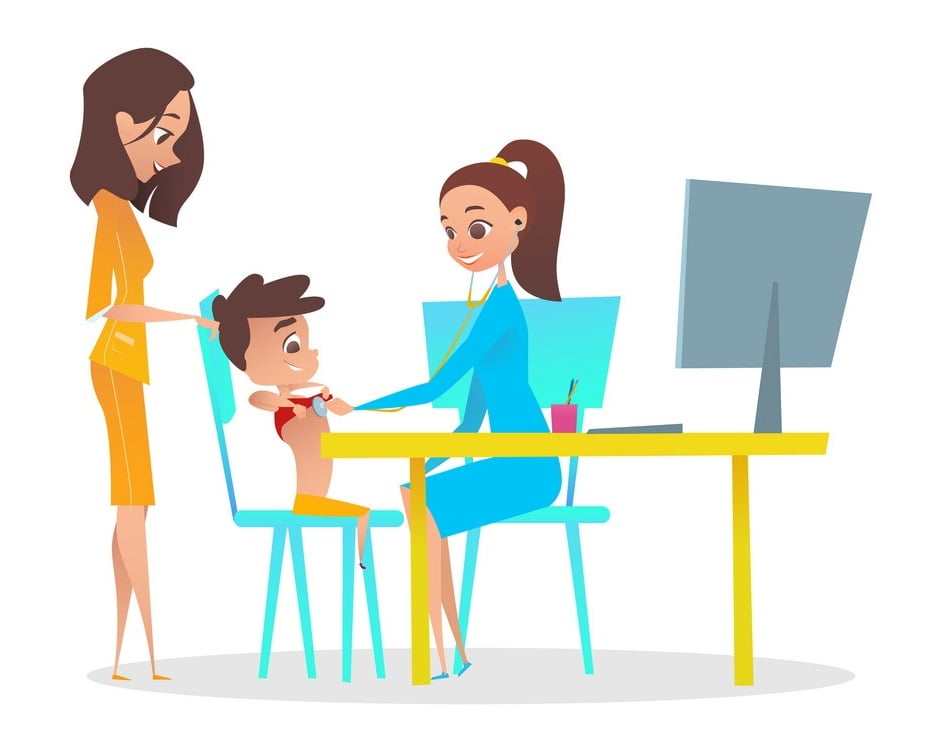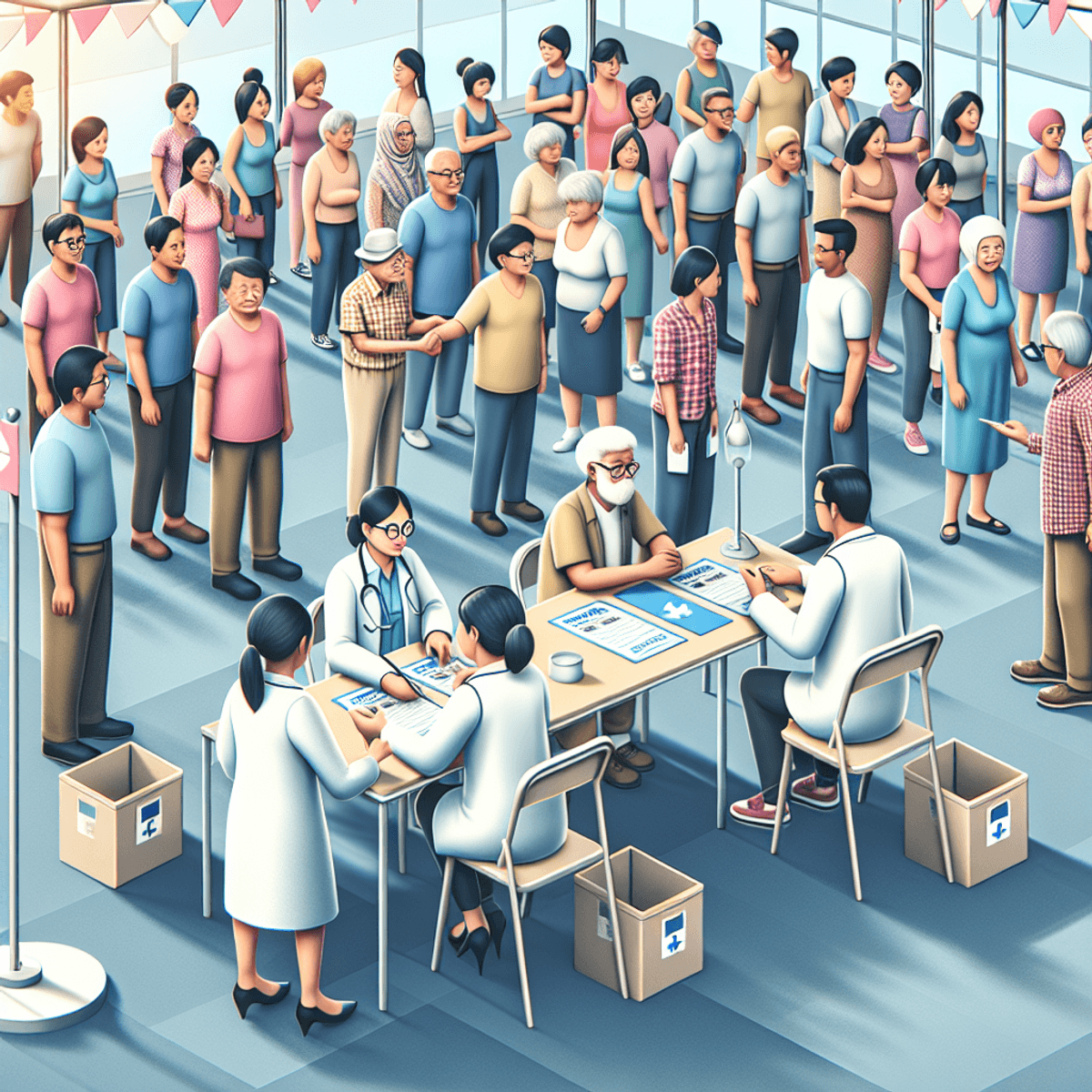Services
Expand Your Clinic By Free Camps
Introduction
Expand your clinic by conducting free camp with Disha Arogya Dham through free camps is a strategic way to improve community health and increase your clinic’s reach. Free medical camps allow clinics to provide essential healthcare services to underserved populations who might otherwise lack access. These initiatives foster goodwill and trust, offering a platform for both immediate care and long-term engagement with the community.
In this article, you’ll learn about:
- Benefits: Discover how free camps can boost your patient base, enhance community engagement, and build a positive reputation for your clinic.Implementation: Gain insights into the logistics involved in organizing a successful free camp, from selecting a location and assembling a team to promoting the event and ensuring smooth operations on the day.
- Partnerships: Explore the potential of collaborating with local organizations, NGOs, or government agencies to maximize the impact of your free camp and tap into existing networks.
- Sustainability: Learn how to leverage free camps as a stepping stone towards establishing long-term healthcare initiatives in underserved areas, ensuring continued support for those in need.
- By the end of this article, you’ll have a comprehensive understanding of how free medical camps can not only expand your clinic but also make a significant difference in the lives of communities that lack access to quality healthcare. So let’s dive in and explore this rewarding endeavor!
- Challenges: Understand the logistical and operational hurdles you may face and how to overcome them.
- Practical Steps: Get actionable advice on organizing successful free medical camps, from planning to execution.
Whether you aim to address common conditions like slip disc issues or broader health concerns, these outreach initiatives can significantly contribute to your clinic’s growth and community impact.
Understanding Free Medical Camps
Free medical camps are community-driven initiatives that provide essential healthcare services at no cost to underserved populations. These events aim to bridge the gap in healthcare access, ensuring that individuals who lack the financial means can still receive necessary medical attention. By offering services such as general check-ups, screenings, consultations, and even minor procedures, free medical camps can address the immediate healthcare needs of these communities. Additionally, they offer a platform for health education and awareness, empowering individuals to take better care of their health in the long run.
To ensure the success and sustainability of your free medical camps, it’s crucial to establish partnerships with local organizations or healthcare providers. This collaboration can help streamline operations, secure necessary resources, and ensure continuity of care beyond the camp itself.
Overcoming Challenges
Organizing a free medical camp comes with its fair share of challenges. Logistical hurdles like finding a suitable location, arranging medical equipment and supplies, and managing a large influx of patients can be daunting. However, with careful planning and resource allocation, these challenges can be overcome.
Consider reaching out to local volunteers or medical students who can assist in various capacities during the camp. Their support can help alleviate the burden on your clinic’s staff while also fostering community engagement.
Practical Steps for Success
To organize a successful free medical camp, start by defining your goals and target population. Conduct thorough research to understand the prevalent health issues in the area you aim to serve. This will help tailor your services accordingly and ensure maximum impact.
Create a detailed plan encompassing aspects like logistics, staffing requirements, outreach strategies, and post-camp follow-up. Seek permissions from relevant authorities if required and communicate with local communities to generate awareness about the event.
On the day of the camp, efficient registration processes and systematic patient flow are key to managing crowds effectively. Ensure proper documentation of patient details and medical records for future reference.
Remember that a free medical camp is not just an isolated event but an opportunity to build lasting relationships with communities in need. Establish mechanisms for ongoing support through follow-up clinics or referrals to partner healthcare providers.
Conclusion
Free medical camps hold immense potential to expand your clinic’s reach while making a tangible difference in the lives of underserved populations. By addressing healthcare disparities and fostering community engagement, these initiatives embody the true essence of social responsibility in the medical profession. So, equip yourself with the knowledge shared in this article, and embark on a journey that combines professional growth with meaningful impact.
Types of Services Offered
Free medical camps can offer a wide range of services depending on the needs of the community:
- General Check-ups: Basic health screenings including blood pressure, glucose levels, and cholesterol.
- Specialized Check-ups: Focused examinations for specific conditions like chronic migraine or diabetes.
- Preventive Care: Immunizations, dental check-ups, and nutritional counseling.
- Treatment Services: Minor surgical procedures, wound care, and distribution of free medications. Outreach Programs: Information sessions on topics like hygiene, family planning, and managing chronic diseases.
- Community Education: Workshops to raise awareness about common health issues and promote healthy lifestyle choices.
- Psychological Support: Counseling sessions to address mental health concerns and offer emotional support.
- By offering a diverse range of services, these camps ensure that the healthcare needs of the community are addressed comprehensively. This holistic approach not only improves individual health outcomes but also contributes to the overall well-being of the community.

Registration Process and Health Cards
Patients attending these camps typically undergo a registration process. This helps in managing the flow of attendees and ensures that everyone receives appropriate care. Although there is usually no registration fee, having an organized system is crucial for effective service delivery.
Issuing health cards during these camps is another significant aspect. These cards serve as a record of the medical services provided and facilitate follow-up care. Health cards help clinics track patient history and improve continuity in care, making future interactions more efficient and targeted. Furthermore, health cards also empower individuals by giving them a sense of ownership over their healthcare journey.
It allows patients to keep track of their own medical history and serves as a valuable resource when seeking care from other healthcare providers. In addition, these cards can be used as identification for accessing various healthcare facilities and services in the future. By implementing a registration process and issuing health cards, these camps not only provide immediate medical assistance but also lay the foundation for long-term healthcare management within the community.
Benefits of Organizing Free Camps
1. Increased Patient Base
Offering free services at medical camps can be a powerful strategy for attracting new patients. When you provide essential healthcare services without cost, you lower the barrier to access for many individuals who may not otherwise seek medical attention. This immediate care can serve as an introduction to your clinic’s capabilities and standards, often leading to a higher likelihood that these patients will return for future services.2. Community Engagement and Trust-building
Organizing free medical camps can foster a sense of community engagement and trust. By actively reaching out to underserved communities and offering them much-needed healthcare, you demonstrate your commitment to their well-being. This can help build trust and rapport, making individuals more likely to seek care from your clinic in the future.
3. Early Detection and Prevention
Medical camps provide an opportunity for early detection of diseases and conditions that may otherwise go unnoticed. Through screenings and routine check-ups, healthcare professionals can identify potential health issues at an early stage, enabling timely intervention and prevention of further complications.
4. Public Health Education
In addition to providing medical services, free camps offer a platform for public health education. By conducting awareness sessions on topics like hygiene, nutrition, and disease prevention, you empower individuals with knowledge that can contribute to better long-term health outcomes.
5. Professional Growth and Skill Enhancement
Participating in free medical camps can be a valuable learning experience for healthcare professionals. It allows them to gain exposure to diverse patient populations, develop their clinical skills, and broaden their understanding of community healthcare needs.
By considering these benefits and incorporating them into your outreach efforts, you can make a significant impact on the health of underserved communities while also strengthening your clinic’s reputation and long-term viability.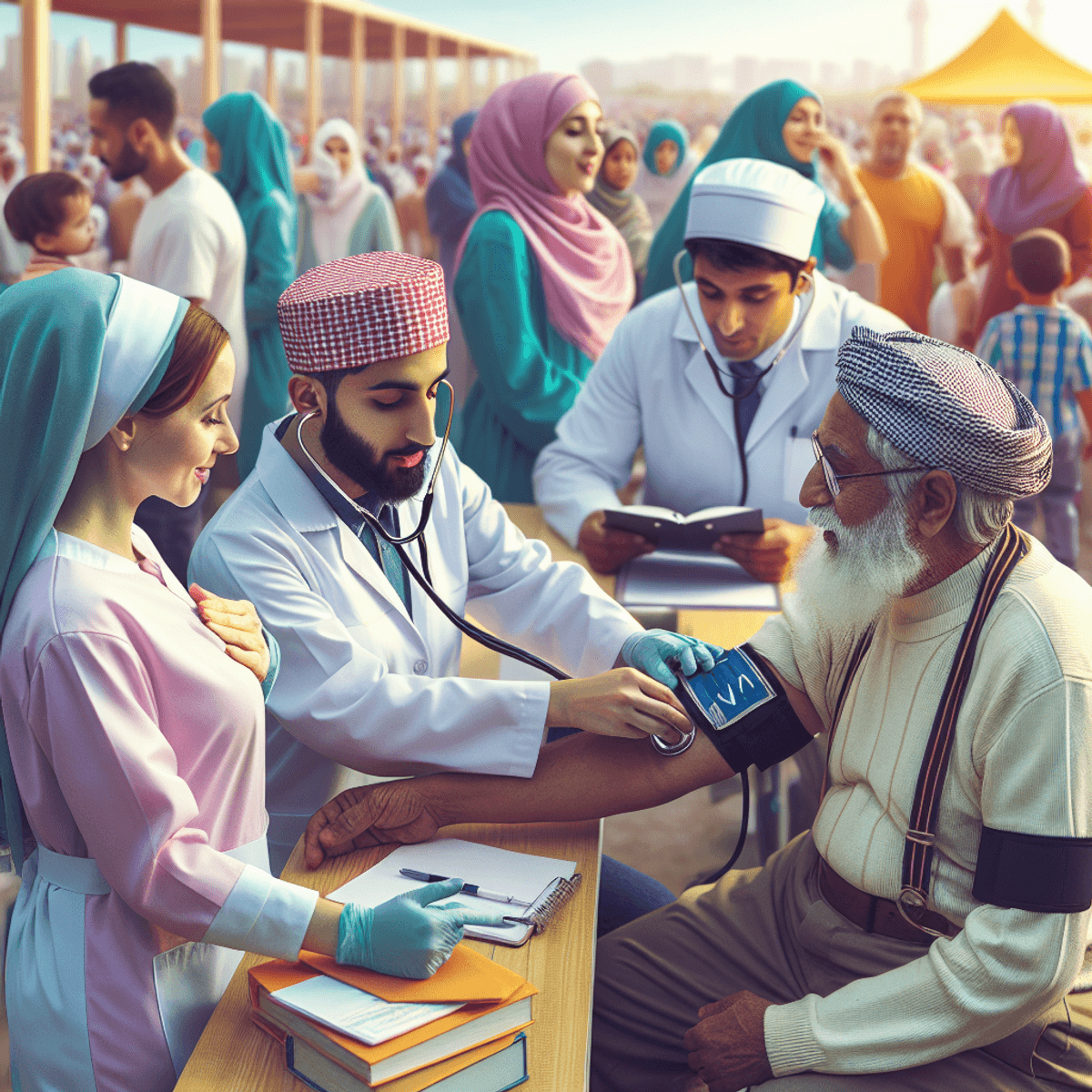
How Free Camps Benefit Your Clinic
- Drawing in New Patients: Free camps attract individuals from various backgrounds, including those who have limited access to healthcare. These new patients get a firsthand experience of your clinic’s services, which can make them more likely to choose your clinic for their ongoing healthcare needs. Increased Patient Loyalty: When patients receive quality care and support through free camps, they develop a sense of trust and loyalty towards your clinic. This can result in long-term patient relationships, leading to a more stable patient base and increased revenue for your clinic.
- Enhanced Community Engagement: By organizing and participating in free camps, your clinic becomes an active contributor to the community’s health and well-being. This level of engagement can improve your clinic’s reputation, foster positive word-of-mouth referrals, and attract more patients in the long run.
- Opportunities for Collaboration: Free camps often involve collaboration with local organizations, nonprofits, or government agencies. These partnerships can lead to synergistic efforts, enabling you to tap into their resources, expertise, and networks. This collaborative approach enhances the impact of your outreach efforts and expands your reach within the community.
- Social Responsibility: Participating in free medical camps demonstrates your clinic’s commitment to social responsibility. It showcases that you are not solely driven by profit but genuinely care about the health and well-being of underserved populations. This can positively influence public perception of your clinic and differentiate you from competitors.
- While organizing free medical camps requires effort and resources, the benefits they offer far outweigh these challenges. They present a unique opportunity to make a tangible difference in people’s lives, build strong community relationships, and foster sustainable growth for your clinic. So why wait? Start planning your next free camp today!
- Developing Ongoing Care Relationships: After receiving initial care at a free camp, many patients may require follow-up treatments or regular check-ups. This creates an opportunity for you to convert them into regular patients. Offering continuity of care establishes trust and encourages long-term patient relationships. It also provides an opportunity to educate patients about the importance of preventive care and the services your clinic offers. This can lead to increased patient retention and loyalty, benefiting your clinic’s long-term growth. Additionally, word-of-mouth referrals from satisfied patients can further expand your patient base. So not only are you providing immediate medical assistance to those in need, but you are also building a sustainable and thriving practice in the process.

For example, if you provide specialized check-ups or treatments for conditions like chronic migraine at your free camp, attendees dealing with these issues will appreciate the targeted support. When they need follow-up care or more comprehensive treatment plans, they are likely to return to your clinic, now seeing it as a reliable source of specialized medical attention.
Engaging in free medical camps not only helps in attracting new patients but also plays a crucial role in fostering patient loyalty and expanding your clinic’s reach within the community.
2. Community Engagement
Free medical camps are an essential way to attract new patients by actively involving the community. By addressing the health needs of local residents, clinics can establish meaningful connections that go beyond the camp itself. This engagement often leads to:
- Building connections with local residents: Offering free services shows a clinic’s dedication to the community’s well-being, building trust and loyalty among potential patients. This connection encourages individuals to choose the clinic for their ongoing healthcare needs, turning one-time visitors into regular patients.
- Opportunities for collaboration: Clinics can team up with other local organizations, such as non-profits and community groups, working towards similar goals. These partnerships can enhance resource sharing and increase the overall impact of the health camps. Collaborating with trusted entities within the community amplifies outreach efforts and strengthens the clinic’s reputation.
By actively participating in community health initiatives, clinics not only attract a larger patient base but also lay the groundwork for long-term relationships and collaborative opportunities. This community-oriented approach can result in improved health outcomes for the local population, as well as a stronger sense of cohesion and support within the community. Additionally, it is an opportunity for clinics to give back and fulfill their social responsibility. Engaging with the community in this way not only benefits the clinic but also contributes to the overall well-being of the society it serves.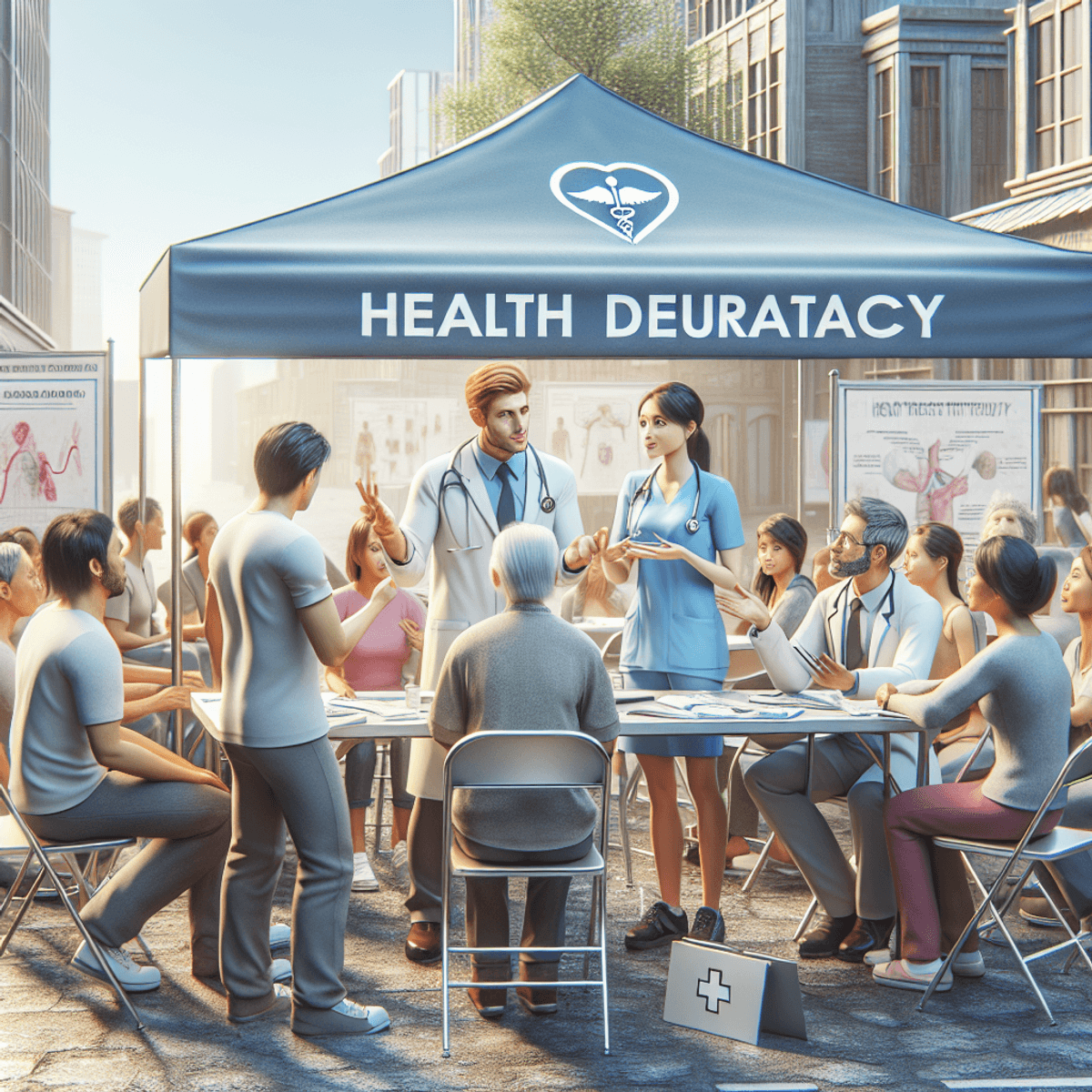
3. Health Education and Awareness Initiatives During Free Camps
Clinics play a vital role in promoting health literacy at free medical camps. By offering educational materials and workshops on preventive measures, clinics can empower attendees with knowledge that enhances their well-being. Information on topics such as chronic disease management, healthy lifestyle choices, and mental health can be disseminated effectively during these events.
This can help individuals make informed decisions about their health and take proactive steps towards prevention. Furthermore, such initiatives can also address common misconceptions or myths surrounding certain health issues, leading to a more accurate understanding of medical conditions and treatments.
4. Networking and Collaboration Opportunities
Participating in community health camps opens doors for collaboration with other healthcare providers, NGOs, and governmental organizations. These partnerships can lead to shared resources, knowledge exchange, and joint efforts in addressing larger public health challenges. By working together, clinics can maximize their impact on the community and promote a more comprehensive approach to healthcare delivery.
In conclusion, community engagement through free medical camps goes beyond individual patient care. It fosters trust, strengthens relationships, promotes health literacy, and creates a network of support that can benefit both the clinic and the community in the long run. rces, knowledge exchange, and joint efforts in addressing larger public health challenges. By working together, clinics can maximize their impact on the community and promote a more comprehensive approach to healthcare delivery.
In conclusion, community engagement through free medical camps goes beyond individual patient care. It fosters trust, strengthens relationships, promotes health literacy, and creates a network of support that can benefit both the clinic and the community in the long run.
- Health Education Campaigns: Conduct sessions on common health issues and prevention strategies.
- Resource Distribution: Provide pamphlets, brochures, and other educational materials.
- Interactive Workshops: Engage participants in activities that reinforce learning.Health Education Campaigns: Conduct sessions on common health issues and prevention strategies.
- Resource Distribution: Provide pamphlets, brochures, and other educational materials.
- Interactive Workshops: Engage participants in activities that reinforce learning.
- Collaboration with Local Organizations: Partner with schools, community centers, and non-profit organizations to expand reach and impact.
- Follow-up Care and Referrals: Ensure continuity of care by providing follow-up appointments or referrals for specialized services when needed.
- Empowerment through Training: Train community members as health volunteers, empowering them to take charge of their own health and support others in their community.
- By adopting these strategies, clinics can transform free medical camps into comprehensive community engagement platforms that address not only immediate healthcare needs but also contribute to the long-term well-being of the community.
These initiatives not only attract new patients but also foster ongoing care relationships by promoting informed health decisions. ain community members as health volunteers, empowering them to take charge of their own health and support others in their community.
By adopting these strategies, clinics can transform free medical camps into comprehensive community engagement platforms that address not only immediate healthcare needs but also contribute to the long-term well-being of the community.
These initiatives not only attract new patients but also foster ongoing care relationships by promoting informed health decisions. The impact goes beyond the individuals directly served, creating a ripple effect that can lead to healthier communities overall.
4. Building Trust and Reputation Through Compassionate Care Delivery
Offering free services can attract a larger patient base, including individuals who might not have sought care otherwise. This initiative enables clinics to establish long-term relationships with new patients through ongoing care provision. Compassionate care practices at events foster trust and loyalty, positioning the clinic as a reliable healthcare provider. The positive image of being a clinic that genuinely cares for the community’s well-being can lead to increased community involvement and patient retention, vital aspects when looking to expand your clinic through free camps.
This can also enhance the clinic’s reputation, as word-of-mouth spreads about the compassionate care provided. The clinic may become known as a trusted institution that prioritizes the health and well-being of the community. As a result, people may be more likely to seek care at the clinic even outside of the free camps, positively impacting the clinic’s patient base and sustainability.
5. Using Volunteer Support While Managing Operational Costs Effectively
Engaging volunteers is a strategic approach to managing the operational costs of free medical camps. Volunteers, ranging from medical students to retired healthcare professionals, bring diverse skills and enthusiasm to the event. Their contribution can help alleviate the burden on clinic staff, allowing them to focus on providing quality care. Additionally, relying on volunteers can significantly reduce expenses related to staffing, as they often offer their services for free or at a minimal cost. However, it is important to ensure proper training and supervision of volunteers to maintain the quality and safety of care provided.
6. Building Partnerships with Local Organizations
Collaborating with local organizations can greatly enhance the impact of free medical camps. Non-profit organizations, community centers, religious institutions, and schools can help in spreading awareness about the events and reaching out to underserved populations. They may also provide logistical support, such as venue arrangements and volunteer recruitment. Such partnerships not only broaden the reach of the camps but also create a sense of unity within the community, fostering a stronger network of support for healthcare initiatives.
7. Collecting Data for Future Planning and Advocacy
Collecting data during free medical camps is crucial for future planning and advocacy efforts. Gathering information about patients’ demographics, health conditions, and access to healthcare helps identify specific needs within the community. This data can inform decisions regarding resource allocation, targeted outreach programs, and the development of sustainable healthcare solutions tailored to local requirements.
In conclusion, while organizing free medical camps requires careful planning and coordination, the benefits extend far beyond immediate patient care. These events serve as powerful tools for community engagement, reputation building, and addressing healthcare disparities in underserved areas. By implementing these strategies and continuously evaluating their effectiveness, clinics can maximize the positive impact of free medical camps while ensuring long-term sustainability.
- Cost Reduction: Using volunteers helps reduce expenses, allowing clinics to allocate funds towards essential resources.
- Community Involvement: Volunteers often come from the local community, fostering a sense of ownership and commitment.
- Attracting New Patients: Free services draw in individuals who may not seek care otherwise, expanding your patient base.
- Learning Experiences: For volunteers, these events offer valuable hands-on experience and exposure to real-world healthcare challenges. Additionally, free medical camps can also serve as learning experiences for volunteers, offering them valuable hands-on experience and exposure to real-world healthcare challenges. This can be particularly beneficial for medical students or professionals looking to broaden their skill set. Furthermore, by allocating funds towards essential resources rather than staffing costs, clinics can effectively reduce expenses, allowing for the provision of quality care even with limited resources.
The involvement of local volunteers also fosters a sense of ownership and commitment within the community, ultimately strengthening the bond between the clinic and its patients. Lastly, by attracting individuals who may not seek care otherwise, free medical camps have the potential to expand your patient base, creating opportunities for long-term engagement and relationship-building.
- In conclusion, while organizing a free medical camp may require careful planning and coordination, the benefits it brings – from community involvement and cost reduction to learning experiences and increased patient outreach – make it a powerful tool in addressing healthcare disparities and fostering sustainable healthcare solutions in underserved areas.
To maximize the benefits of volunteer support, implementing effective volunteer recruitment strategies is essential. By effectively using volunteer support, clinics can ensure a successful and cost-efficient camp while also enhancing their reputation and community ties.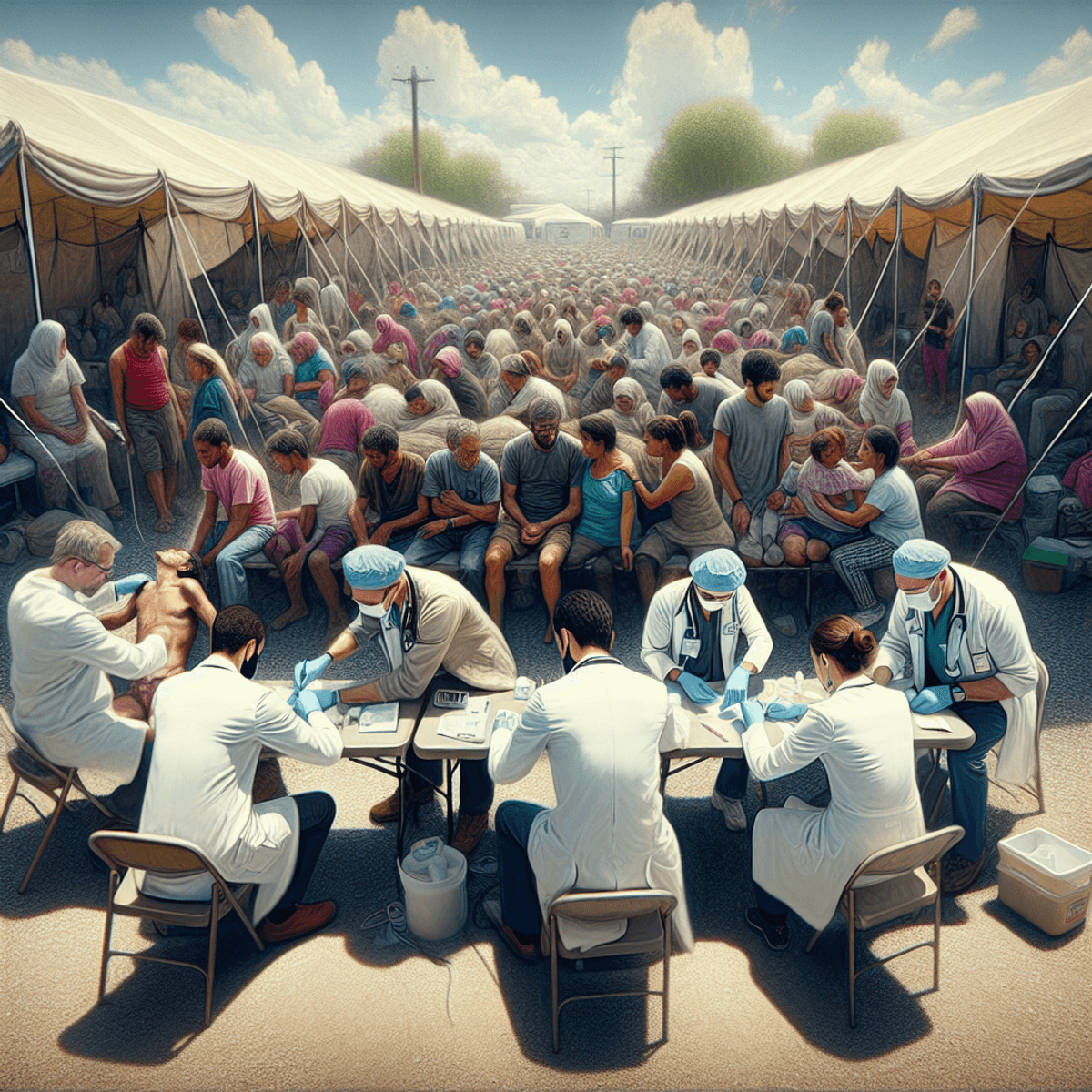
How Free Medical Camps Can Help Improve Future Clinic Services
Free medical camps offer a unique chance to gather important information about community health issues. This information can be used to improve future clinic services and make healthcare better overall.
Ways to Collect Information During Free Camps:
- Patient Surveys: Handing out questionnaires to learn about patient backgrounds, common health problems, and difficulties in accessing healthcare.
- Health Screenings: Keeping track of results from tests like blood pressure and glucose levels to find out what conditions are common in the community.
- Electronic Health Records (EHRs): Using EHRs to record patient visits and keep track of any follow-up care they might need.
- Feedback Forms: Asking attendees for their thoughts on the services they received and their overall experience.
By using these methods, clinics can:
- Find out what health issues are most common.
- Adjust future services to better meet the needs of the community.
- Improve patient care strategies based on real-world information.
Using these events to collect data not only helps with immediate care but also lays the groundwork for long-term improvements in healthcare.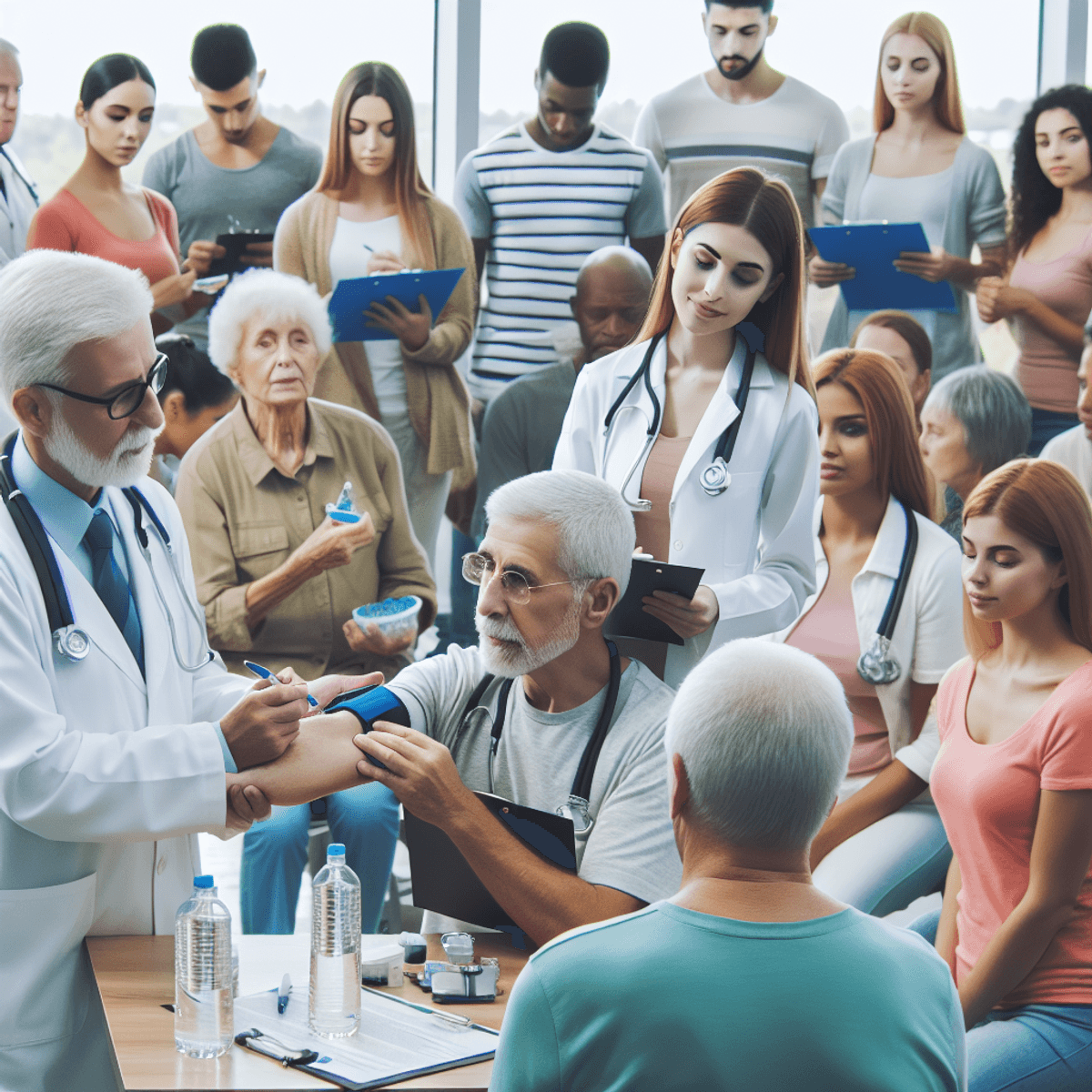
Media Exposure And Publicity Strategies To Maximize Impact
Generating media coverage for your free medical camps can significantly enhance your clinic’s visibility. Employing effective media coverage tactics for event promotion ensures you reach a wider audience. This can be done by:
Issuing press releases to local media outlets.
Leveraging social media platforms to spread the word about your event.
Collaborating with local community organizations or influencers who can help amplify your message.
Inviting journalists or bloggers to attend and cover the camp.
Sharing success stories or testimonials from previous camps to showcase the impact of your services.
By maximizing media exposure, you can attract more attendees, secure potential partnerships or donations, and create a positive reputation for your clinic within the community.
Steps to Leverage Media Attention:
- Press Releases: Draft compelling press releases highlighting the event’s objectives, services offered, and community benefits. Distribute these to local newspapers, radio stations, and online news platforms.
- Social Media Campaigns: Utilize social media platforms like Facebook, Instagram, and Twitter to create buzz. Share engaging content such as behind-the-scenes preparations, patient testimonials, and live updates during the camp.
- Partnerships with Influencers: Collaborate with local influencers or health bloggers who resonate with your target audience. Their endorsement can drive significant attention to your event.
- Local News Coverage: Reach out to local TV stations for on-site coverage. Offer exclusive interviews with healthcare providers and patients to showcase the impact of the camp.
- Community Engagement: Engage with community groups and organizations to help spread the word. Their networks can amplify your message within the local community. This can be done by partnering with local schools, community centers, and religious organizations. Offer to give presentations or workshops on healthcare topics relevant to the community. This not only raises awareness about your clinic but also establishes trust and credibility among potential attendees. Additionally, consider reaching out to local businesses for sponsorships or in-kind donations. Publicize these partnerships as a way to showcase your clinic’s commitment to the community’s well-being. Finally, don’t forget to track and measure the results of your media efforts. Monitor press clippings, online mentions, social media engagement, and attendance numbers to assess the impact of your media campaign and make necessary adjustments for future events.
By strategically utilizing these methods, you can maximize media exposure and effectively promote your clinic’s free camps.
Funding Opportunities Through Grants And Other Sources
Securing funding is crucial for the sustainability of free medical camps. Various grants specifically target healthcare initiatives aimed at improving public health outcomes. Here’s how you can navigate the grants application process:
- Identify Relevant Grants: Look for grants from government agencies, non-profit organizations, and private foundations focused on community health and public service.
- Prepare Comprehensive Proposals: Develop detailed grant proposals that clearly outline the objectives, expected outcomes, and budget requirements of your free medical camps.
- Highlight Community Impact: Emphasize how your camps address unmet healthcare needs and contribute to the overall well-being of underserved populations in your application.
- Leverage Partnerships: Collaborate with local organizations to strengthen your grant applications by showcasing a unified community effort.
- Track and Report Outcomes: Implement systems to track the impact of your camps and provide detailed reports to funders, demonstrating accountability and effectiveness.
By strategically pursuing these funding opportunities, clinics can ensure the continued operation and expansion of their community outreach programs.
Conclusion
Expanding your clinic through free camps offers a unique opportunity to:
- Connect with underserved populations
- Build trust within the community
- Increase your patient base
The benefits of these initiatives—from health education to media exposure—are substantial. If you are considering implementing free camps as part of your expansion strategy, now is the time to take action. Engage volunteers, seek funding opportunities, and start making a positive impact on public health today.
FAQs (Frequently Asked Questions)
What are free medical camps and their purpose?
Free medical camps are organized events aimed at providing healthcare access to underserved communities. They offer a range of services, including specialized check-ups and treatments for specific conditions, such as chronic migraines, without any registration fees.
How can organizing free camps benefit my clinic?
Organizing free camps can significantly expand your clinic’s patient base by attracting new patients who may not have sought care otherwise. Additionally, these events foster community engagement, build trust and reputation through compassionate care delivery, and provide opportunities for health education and awareness initiatives.
What challenges might I face when organizing free medical camps?
Challenges can include managing operational costs, securing volunteer support, ensuring adequate resources for patient care, and effectively promoting the event to reach the intended audience. It is important to plan ahead and collaborate with local organizations to mitigate these challenges.
How can I ensure follow-up care for patients after the camp?
Issuing health cards during the registration process at the camps is crucial for facilitating follow-up care. These cards help track patient information and ensure continuity of care after the event.
What strategies can I use to promote my free medical camp?
Leverage media coverage tactics to maximize publicity for your event. Engage with local media outlets, utilize social media platforms, and collaborate with community organizations to enhance visibility and attract a wider audience.
Are there funding opportunities available for clinics organizing free camps?
Yes, clinics can explore various funding avenues such as grants specifically targeting healthcare initiatives aimed at improving public health outcomes. Understanding the grant application process can help secure necessary funds for organizing these community service events.




